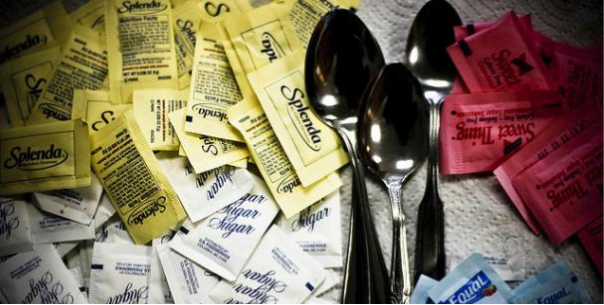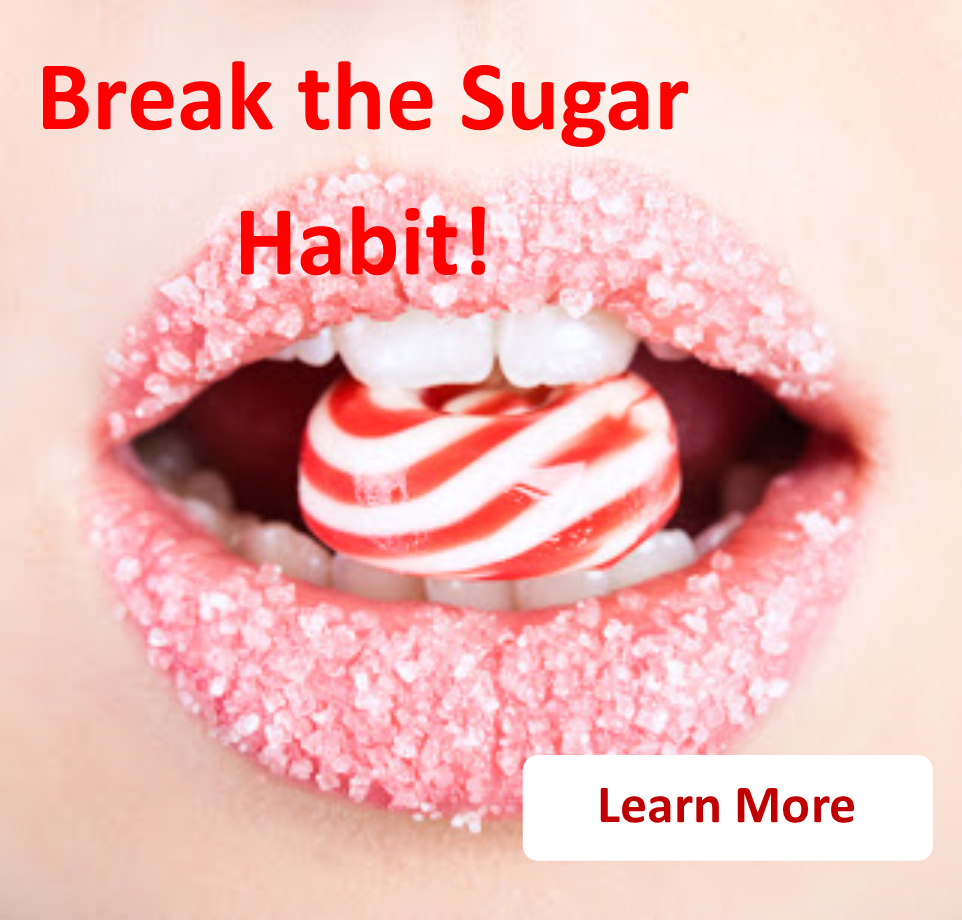Have you fallen for the promise of artificial sweeteners? All the sweetness and none of the downside? Really, who wouldn’t trust something called “Splenda”?

Unfortunately, most of what you hear about artificial sweeteners comes from the companies themselves and what you don’t hear about is the downside of these artificial sweeteners.
Generally, you reach for artificial sweeteners for one of two reasons: you either want to lose weight, or you think that using artificial sweetener will suppress your sugar addiction, or both. But guess what? Artificial sweeteners do neither: they don’t help you lose weight (in fact, they can cause weight gain) and they can make your cravings worse. Artificial sweeteners also deal a health-blow to your body by introducing chemicals that either shouldn’t be in your body, or that you body has a hard time getting rid of.
The health problems associated with saccharine, aspartame, sucralose and other artificial sweeteners are numerous and you should avoid them whenever possible.
But let’s stop here and take a look at what these crazy chemicals are and what they do inside your body.
Guide to Artificial Sweeteners:
- Saccharin: Most people think that saccharin has been banned by the FDA, but this is not true. While saccharin was banned in other countries, it is still available in the United States and is making a comeback. Saccharin was shown to cause bladder cancer in very large doses in animals and was pulled from the shelves because of a public outcry. It also has a metallic after-taste that makes it not so palatable. Companies who manufacture saccharine will tell you that it passes through your body undigested (if this is true, it makes one wonder how it gets from the intestinal tract to the bladder to cause cancer?). Saccharin is again showing up in a lot of artificially sweetened foods because it is super sweet and is now blended with other sweeteners to mask the metallic taste.
- Aspartame: (This is also called Nutrasweet or Equal). Aspartame breaks down into aspartate, phenylalanine and methanol in the body. The first two (aspartate and phenylalanine) are amino acids and fine for most people to take in, but no amount of methanol is good for your body. Manufacturers maintain that the amount of methanol is so small that you don’t have to worry about it, but others think differently. Aspartame has been shown to increase cancers 1 and has been associated with headache, dizziness, mood shifts, nausea and vomiting, abdominal pain and cramps, joint pain, vision changes, slurred speech, diarrhea, seizures, memory loss, numbness and cramping in arms and legs, and fatigue.2
- Sucralose (this is also known as Splenda) What a great name for a product! I’m almost tempted to try it, but since sucralose is an organochloride, I think I’ll stay away. Organochlorides are some of the most toxic substances on the earth (many pesticides are organochlorides and are toxic in small doses). Just because Splenda is an organochloride doesn’t mean it is toxic, but it should raise some eyebrows. Splenda has been shown to increase migraine headaches3 and needs more long-term studies to determine its safety.
- Acesulfame K: This artificial sweetener has been associated with breast, thymus, and lung tumors.
The Bottom Line
If you turn to artificial sweeteners to help you with cravings and weight loss, you might as well not use them at all. This is because artificial sweetener actually cause you to gain weight and continue your addiction to super-sweet tasting foods.
Most of these sweet chemicals cause your insulin to rise. When insulin rise, your blood sugar drops. Low blood sugar causes you to crave and eat more. Studies have shown that people who consume artificial sweeteners eat more calories than people who don’t.4
The bottom line is that there are no good reasons to put these chemicals in your body, you are better off avoiding all sweet-tasting foods and artificial sweeteners.
- Soffritti M, Belpoggi F, Tibaldi E, et al: Life-span exposure to low doses of aspartame beginning during prenatal life increases cancer effects in rats. Environ Health Perspect. 2007 Sep;115(9):1293-7. [↩]
- Aspartame (NutraSweet): Is it Safe? (Nutrasweet : Is It Safe?)
H, J Roberts, The Charles Press, 1990 [↩] - Patel RM, Sarma R, Grimsley E: Popular sweetener sucralose as a migraine trigger. Headache. 2006 Sep;46(8):1303-4. [↩]
- Swithers SE, Davidson TL. A role for sweet taste: calorie predictive relations in energy regulation by rats. Behav Neurosci. 2008 Feb;122(1):161-73. [↩]












A very informative article. Nice to spend some time on reading this. Thanks Dr. Scott
ARe Stevia and its derivatives, Truvia and Purevia, safe to use?
Hi Monica,
Check out this previous post: What About Stevia?